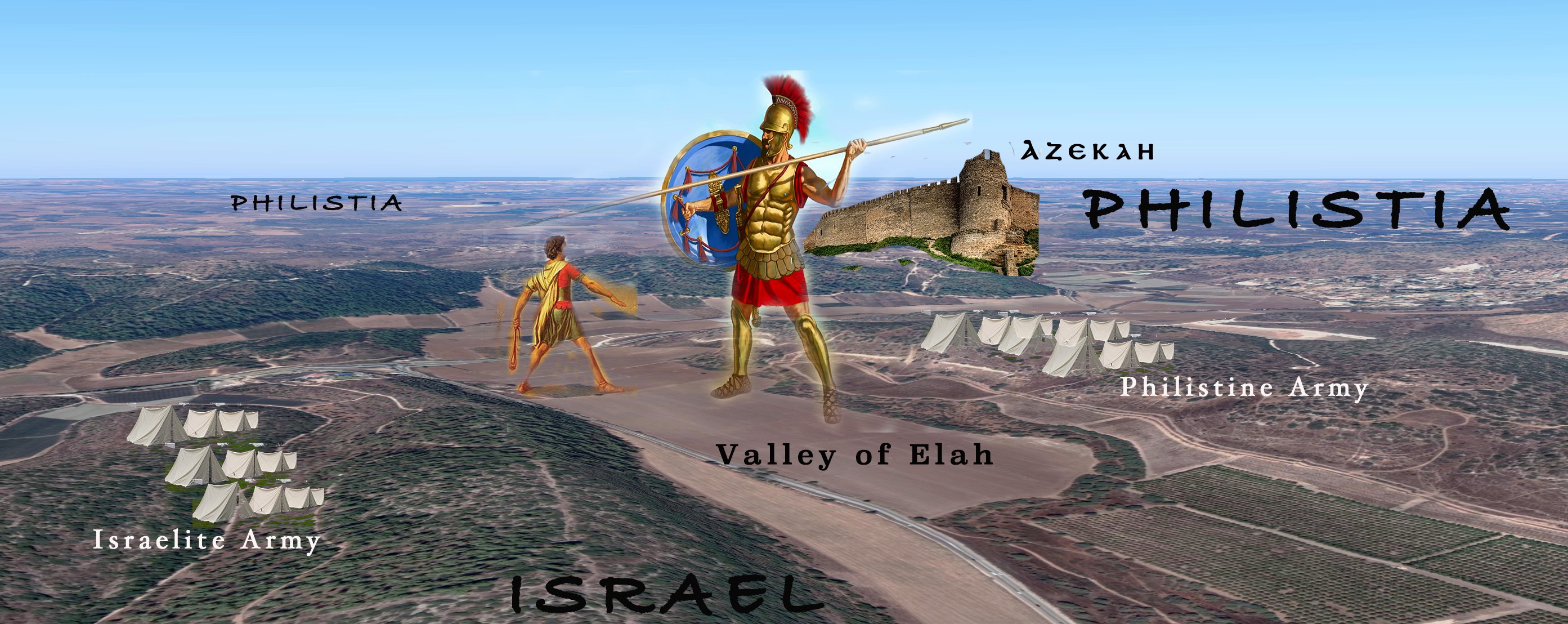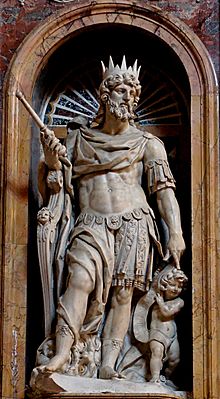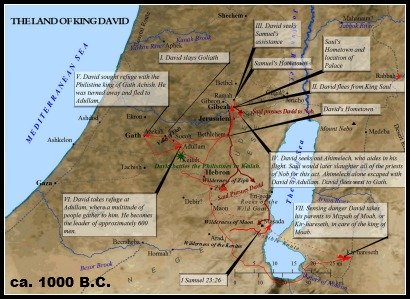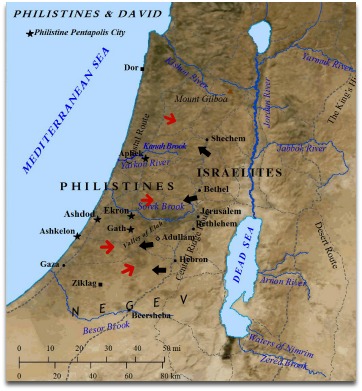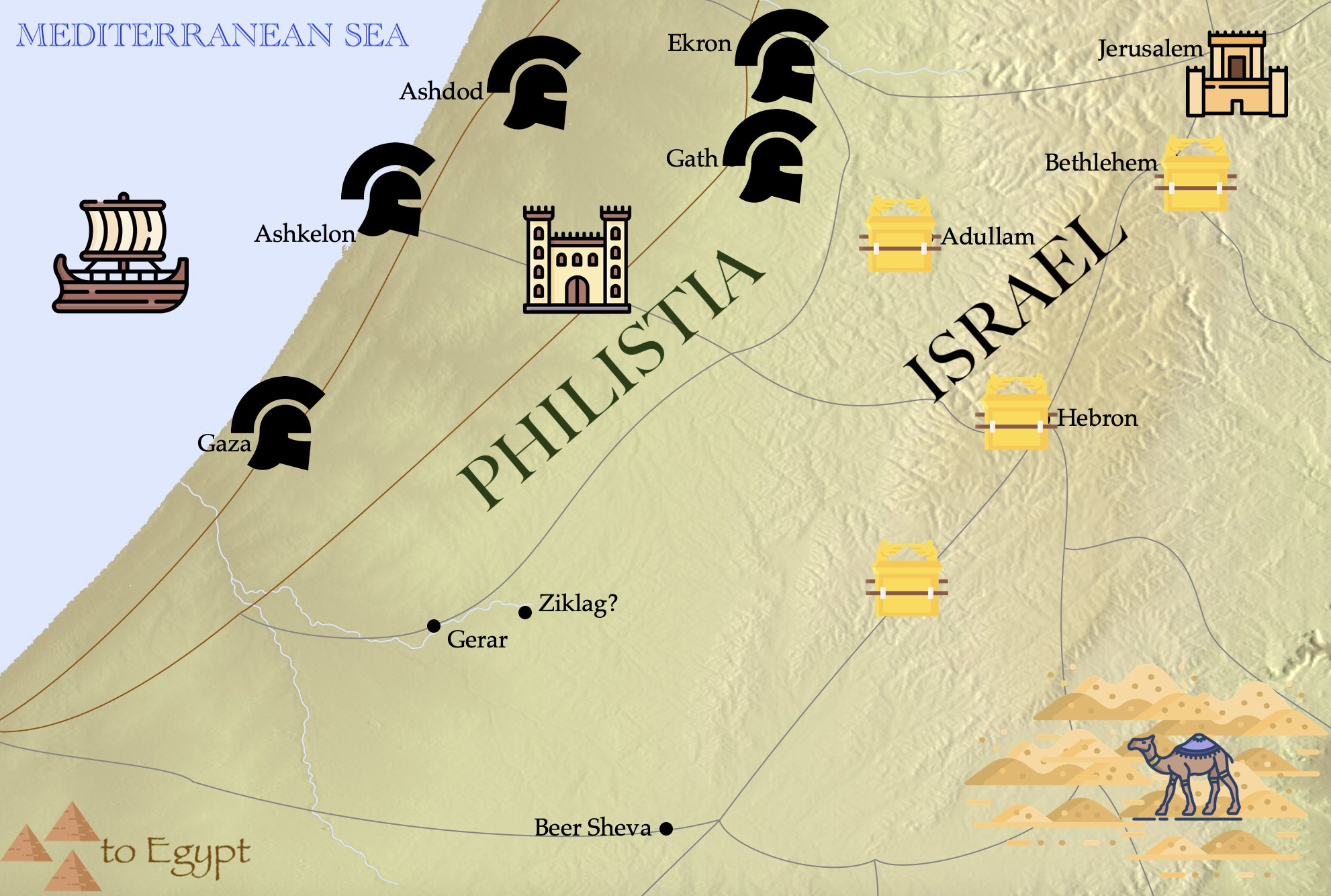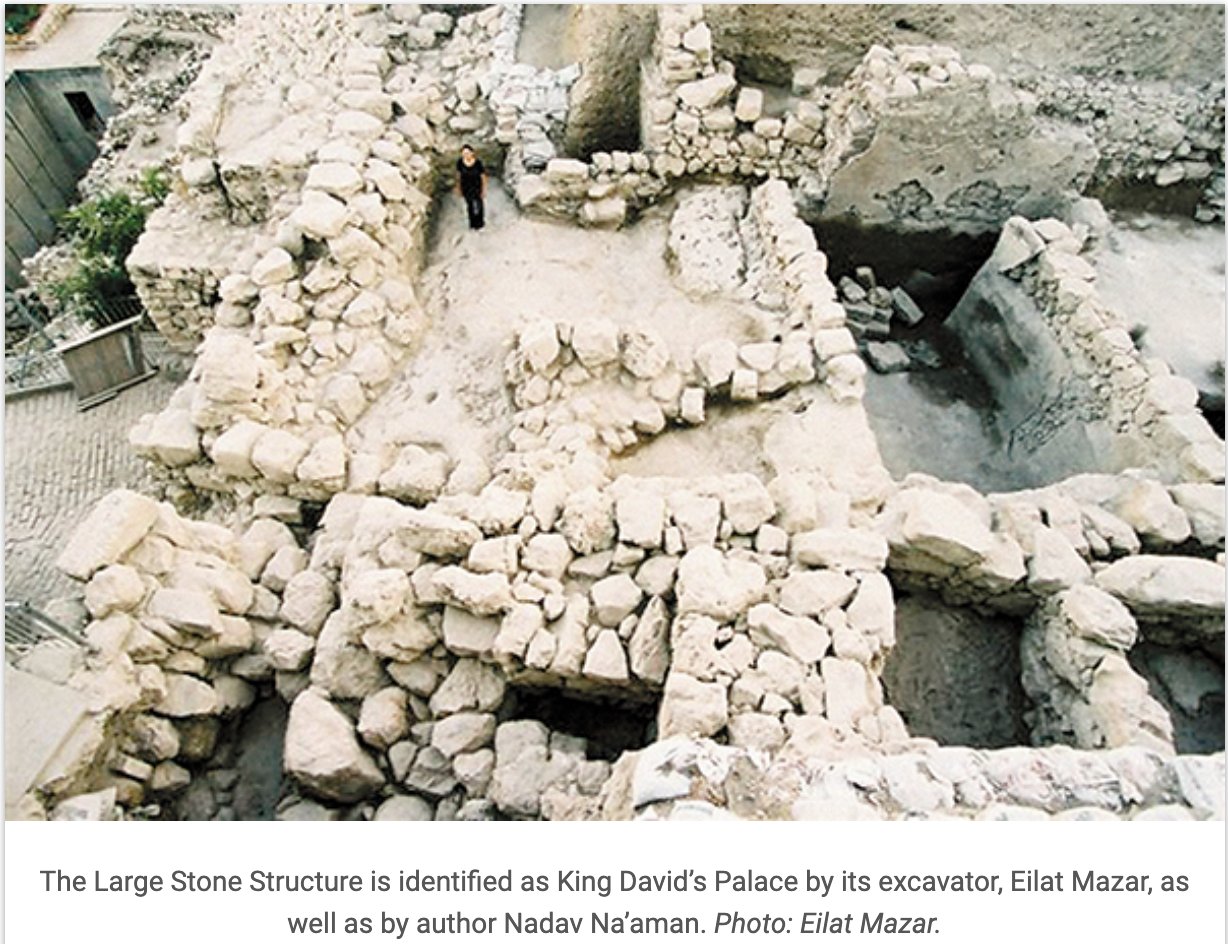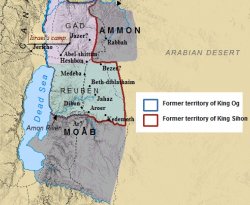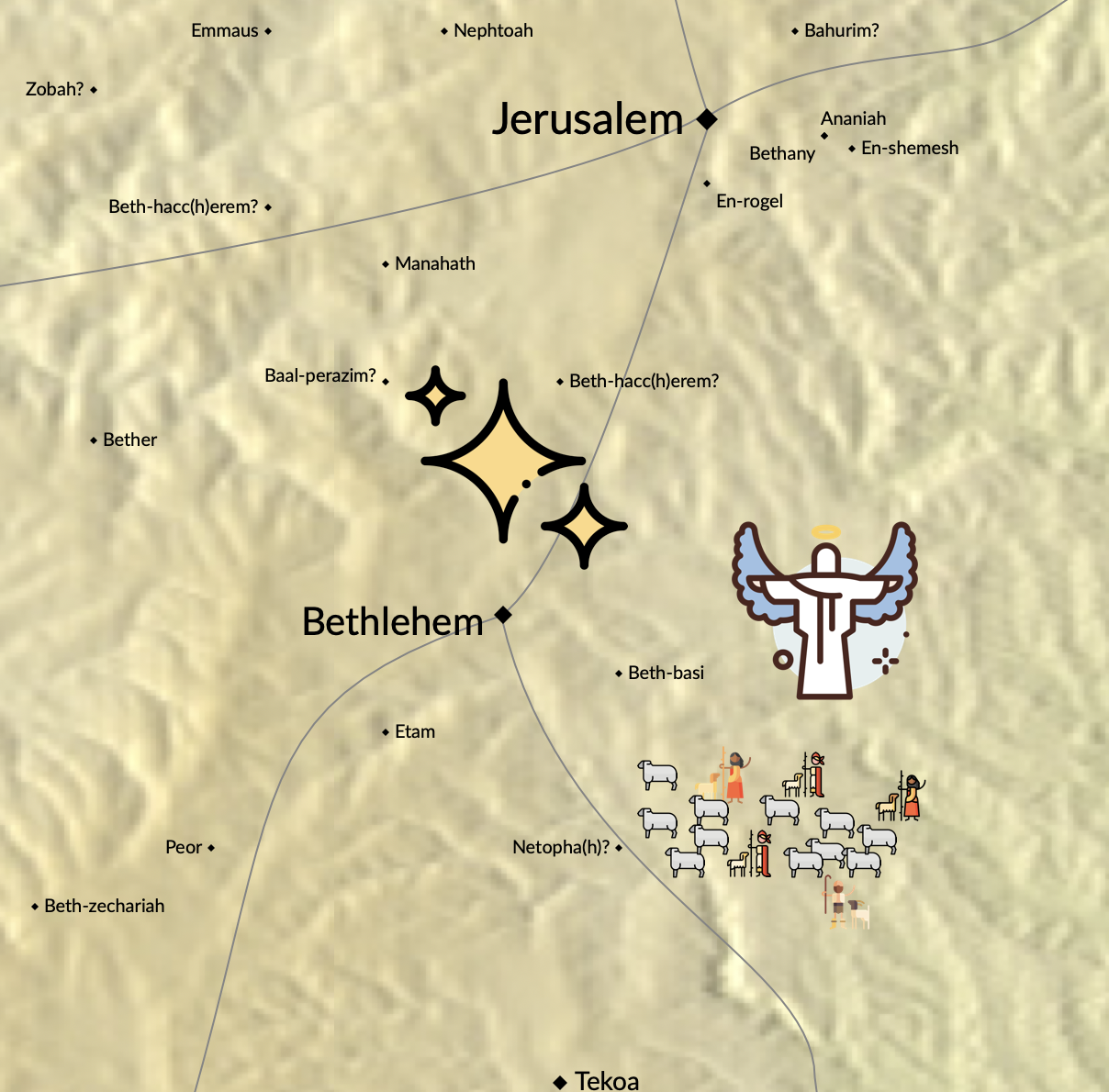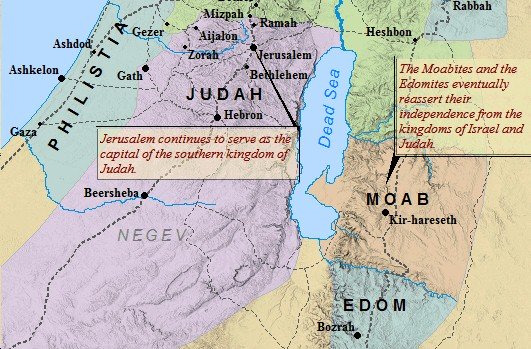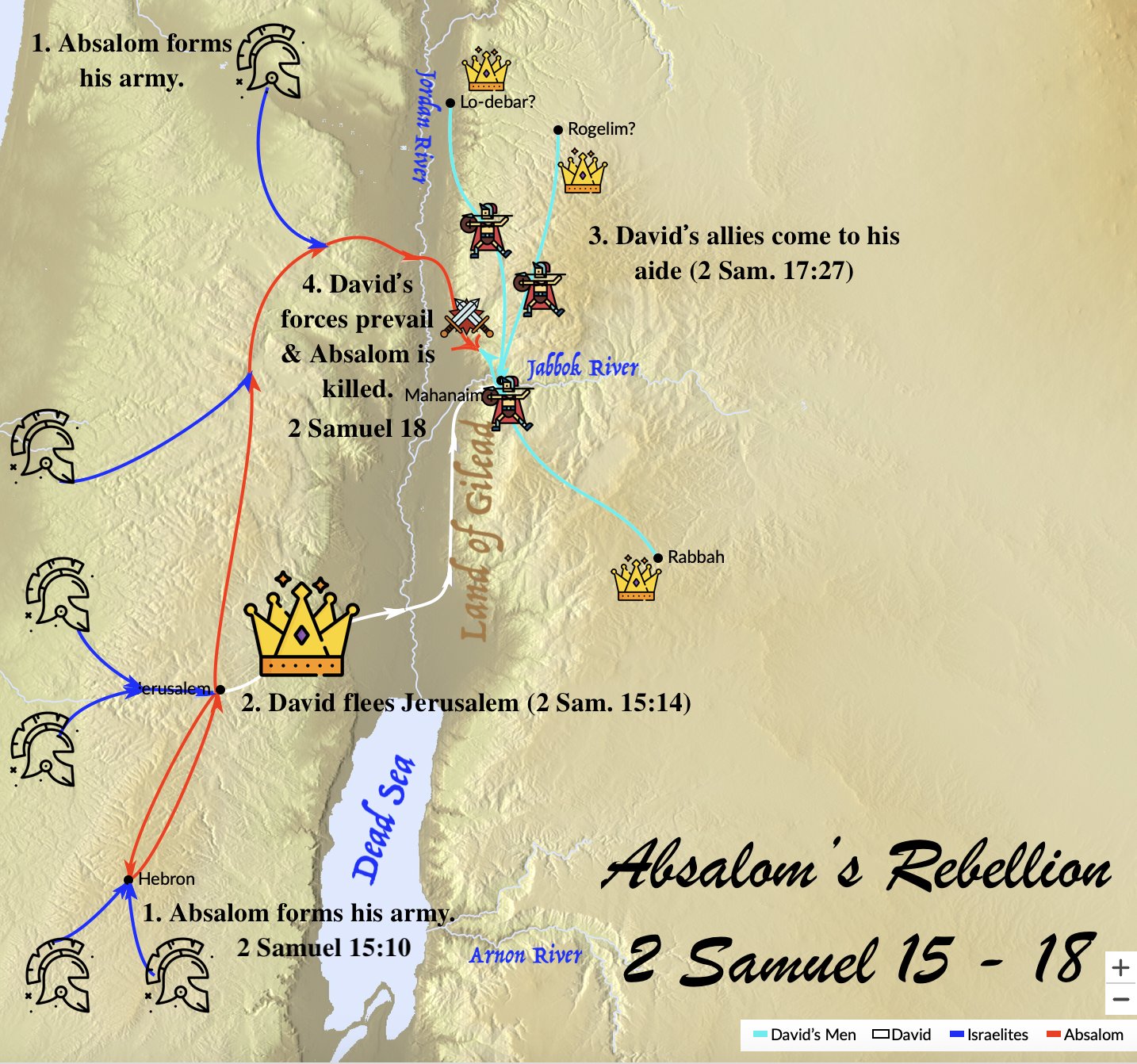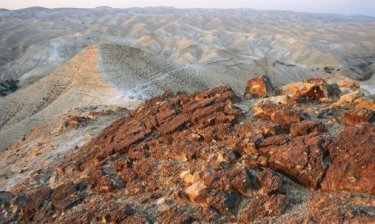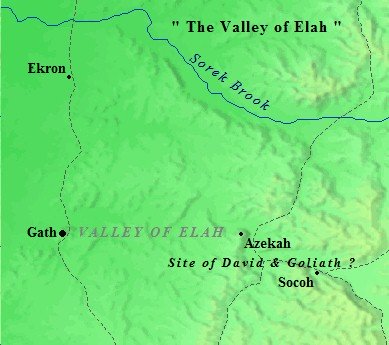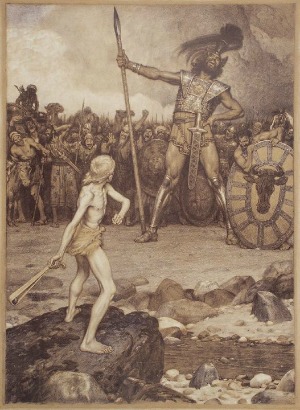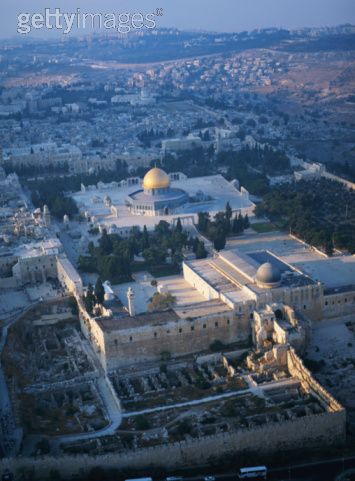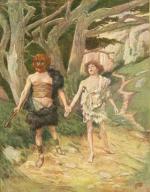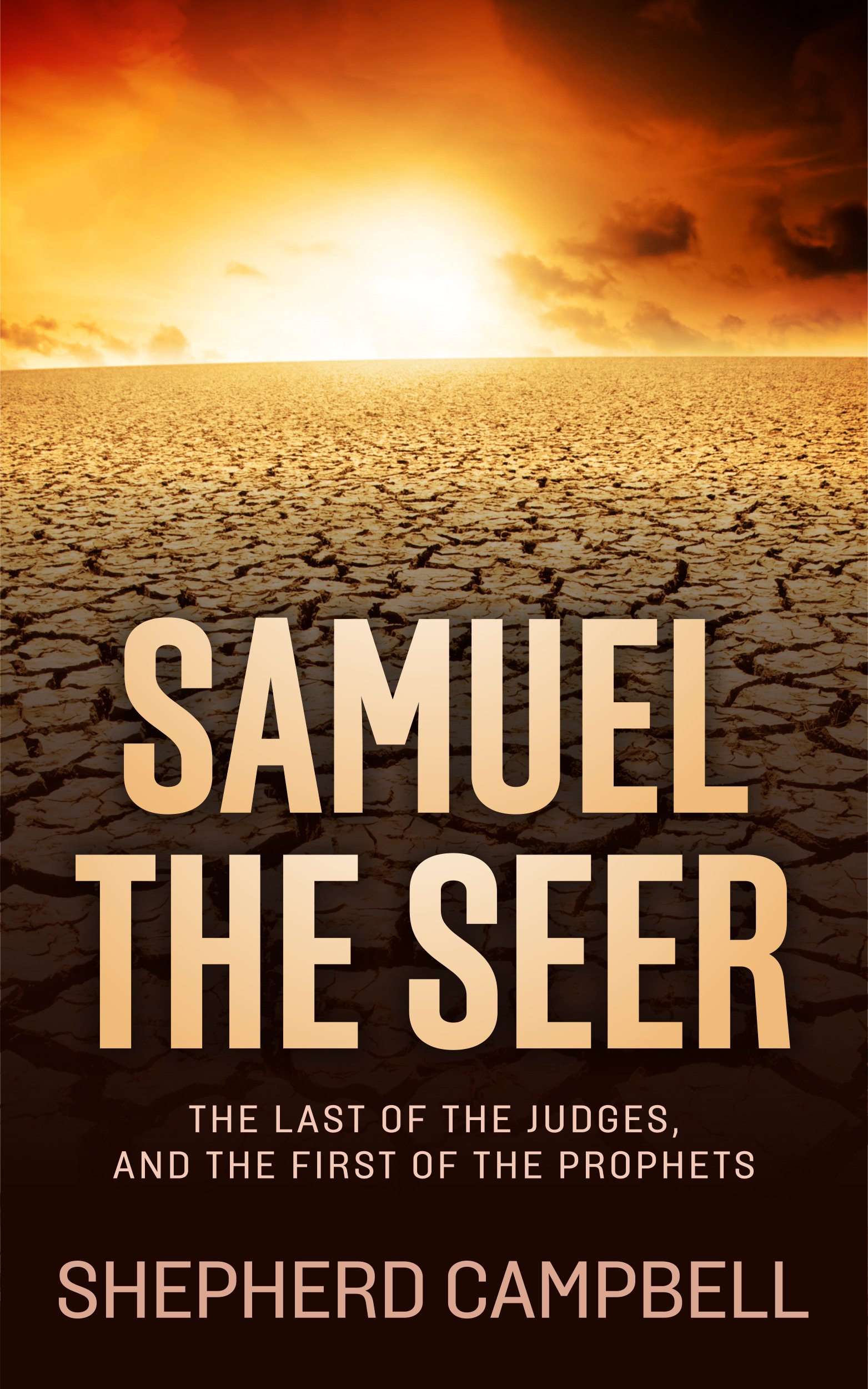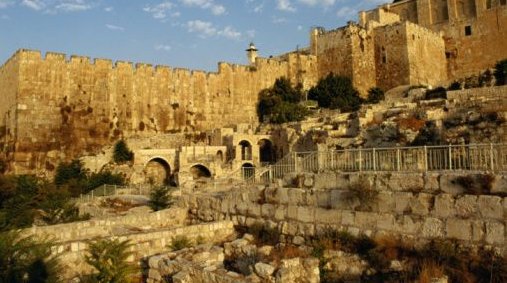- Biblical Maps
- Home Page
- History of Israel Blog
- Ancient Mesopotamia
- Map of Palestine
- Abraham
- Ancient Israel
- 12 Tribes of Israel
- Jerusalem
- The Book of Isaiah
- Palestine
- The Habiru
- Contact Us
- Bible Study Forums
- Media Page
- Visitors Sitemap
- Privacy Policy
- The History of the Old Testament
- In the Days of Noah
- The City of Jericho
VISIT OUR FACEBOOK PAGE!
King David of Israel
The story about King David of Israel takes place primarily in the Old Testament books of I Samuel, II Samuel, I kings, and parts of I Chronicles. However, references to David occur throughout the entire Bible, from the Psalms (many arguably credited to him), to the prophets, and in the New Testament, King David can be found throughout. The rise of David takes place in I and II Samuel, which also happen to be some of the oldest books of the Bible.
King David of Israel is arguably the most celebrated individual in
Israelite history. From David dancing before the Ark of the Covenant, to
David and Bathsheba, the life of King David was one of triumphs, sin and
war. Though an adulterer, a poor father, and a man of war and
bloodshed, David showed a vulnerability and dedication to God on par with the great Patriarchs, and unmatched by any of the Kings of Judah & Israel. His story is one of mankind itself.
The two books of Samuel were combined into one book of Samuel in the Hebrew Bible. In the late 1940'2 the Dead Sea Scrolls were discovered in caves at Qumran on the Dead Sea. Within this trove was a manuscript of Samuel, dating to ca 200 BC. It is the oldest manuscript of I and II Samuel discovered to date. It was a very important book to the Hebrews and Jews of antiquity. Scholars have pointed out that a literary analysis of I and II Samuel indicate the events were likely written during the reigns of either David or Solomon.
King David Page Contents
Click on a link below to view a particular topic on King David of Israel.
|
The Land of King David
Geography of King David King David and the Philistines Family of King David Map of Judah and the South David and Goliath Map of the Valley of Elah |
The Land of King David
Perhaps as important as the story of King David of Israel is the geography the narratives concern. The area, in its totality, is very small. Three main cities emerge in Samuel. These cities are Gibeah, the capital of Saul, Jerusalem, or Jebus before David took the city, and Bethlehem, the birthplace and home of King David of Israel. These cities dwelt in the hill country.
Israel's ties to the hill country is strong, existing from even before David up until this very day. Hebron, near Mamre in the south, would become David's first capital city. It was also in Mamre that father Abraham dwelt for a period of time. The Bible says he had Amorite friends, from which the Jebusite were a part of.
Another interesting city becomes more prominent in David's life is Gath, the hometown of Goliath and Philistine capital city.
One of the common misconceptions, which some will argue the Bible takes pains to create (McKendric, King David)
is that Bethlehem is a remote city in the far south of Judah, and that
David was a simple shepherd from a poor family. Though located south of
Jerusalem along the Central Ridge Route, it is only 5 1/2 miles to the
south, easily reachable within a days journey. Gibeah, where King
Saul's palace was located, was only three miles to the north of
Jerusalem. All three cities could be reached within a day, thus would
have seemingly had intimate knowledge of each other.
The cities,
though, belonged to different tribes. At the time of King David's youth
Bethlehem belonged to the tribe of Judah, Gibeah to the tribe of
Benjamin, of which Saul was a member, and Jerusalem was called Jebus and
belonged to the Amorite offshoot Jebusites. The 12 tribes of Israel
each maintained a fierce sense of identity and independence. Gath,
interestingly, belonged to the Philistine Pentapolis along the western
coast land.
Five cities formed the Philistine league, and the
region occupied by these cities includes the modern day Gaza Strip.
Israel waged a war not too long ago with the occupants of Gaza. That
land today, like during the time of King David of Israel, remains a site
of conflict.
Though in times of threat the tribes of Israel would often join together, sometimes different tribes aiding others, deep rifts, rivalries and jealousies existed between north (of which Benjamin was a member) and south (Judah was the primary southern tribe). Saul was from the north, and David was likely viewed as a southern rebel by many of Saul's ruling elite. The north would have been threatened by David's southern kingdom in Hebron. This rivalry of north and south weaves its way through the David narrative.
It is also a possibility the Philistines may have had connections with Jebus/Jerusalem. The location of Jebus in the central mountains, along with its Canaanite/Amorite identity would have made it a welcomed ally to the Philistines; and some have suggested Jebus paid tribute to them.
Throughout the OT the Philistines sought strongholds in the mountains surrounding Jebus and further south. Control of this region would have effectively cut the Israelite tribes in half. The Israelites fought fiercely for these areas, finally driving them out completely in the reign of King David of Israel.
King David of Israel, as a youth, would have likely encountered Philistine soldiers. The Bible tells of a Philistine outpost in Bethlehem at one point. As David matured he may began to encounter the Philistines on a daily basis. These events took place within range of his hometown, oftentimes in its backyard.
David fought and fled, hiding in the hills and caves of the wilderness, fleeing King Saul, at once battling, another joining, the Philistines, and all the time gathering unto himself a loyal band of mighty warriors. The future King David of Israel would become a complex man of ambition, motivation, skill, and faith.
His influence transcends time and culture, reaching
into the foundations of modern day Judaism and Christianity. Uniting
north and south together and conquering enemies in the region, King
David of Israel became the forerunner of the Messiah, the branch from which the
Savior would one day emerge. The Messiah would bring God's Kingdom to
earth, with Israel at its center. Just as David had during his reign.
Christians
find this Messiah in the personage and divinity of Jesus Christ, and
await His Second Coming. Jews await the first coming of their Messiah,
from the Royal House of King David of Israel, the one predicted by the Jewish
prophets of old. The final result of each will establish God's kingdom
on earth, where God Himself shall rule the nations in peace and
righteousness. Needless to say, such is the importance the Bible places
on King David of Israel.
The Family of King David of Israel
Outside of the Bible little is known about King David of Israel. Very little is known of his childhood and family life, though clues in the Biblical text provide glimpses. These glimpses, as will be seen, sometimes are outside of the common perception concerning King David of Israel.
The archaeology of David and extra-biblical references provide tantalizing clues a King David of Israel did exist, yet concrete evidence is lacking and these finds are often broiled in controversy. David first appears in I Samuel 16.
The Bible indicates King David of Israel was the youngest of either 7 or 8 brothers, though only three are mentioned. His father was an Ephrathite from Bethlehem as mentioned in I Samuel 17:12. The book of Ruth gives further detail about Jesse. Jesse was from the same clan as Naomi, one of Ruth's central characters. After her husband and sons died Naomi journeyed back to her home in Bethlehem with her Moabite daughter-in-law Ruth. Connections between Moab and Israel reach back to the earliest stages of each nation.
Ruth, a Moabite, married Boaz, a wealthy landowner from Bethlehem. Their
son was Obed. Obed had a son named Jesse, father of the future King
David of Israel. This is one clue as to Jesse's prominence, for we learn that
Boaz, perhaps the patriarch of the family, was a "man
of great wealth" according to Ruth
2:1.
"Now Namoi had a kinsman of her
husband, a man of great wealth, of the family of Elimelech, whose name
was Boaz."
The Biblical picture of David
stemming from a well-to-do family does not play with the common
perception of a rags-to-riches story. It is also interesting to note the
royal bloodline of the House of David contained at least one element of
non-Israelite blood in Ruth, a Moabitess. Though it should not be
counted out that somehow the wealth may have been lost between Boaz and
Jesse. Scripture is silent as to the exact details in this matter.
David's ancestors likely were prosperous in and around Bethlehem, and had been for perhaps two or three hundred years. Boaz, Ruth and Naomi would have lived during the period known as the Time of the Judges. This period stretches, depending on one's chronology, anywhere from 100 to 350 years in length, covered mainly in the book of Judges, right up to the time of Samuel. Samuel, who anointed the shepherd boy King David of Israel, was the last of the Judges.
The Bible seems to depict that Jesse was well off, a result of old money dating back to the time of the Judges in Boaz and Ruth. Though the Bible does not attest to this, McKenzie points to Jesse's introduction in the Bible as possible evidence of such stature. Some have claimed Jesse was a scholar.
In I Samuel 16:8 one of Saul's servants recommends David to Saul. In doing so the servant simply refers to "Jesse the Bethlehemite", as if that was enough of an introduction Saul would know whom he is referring to. Keeping in mind the close proximity of the two towns and this may not seem such a far fetched view of the text. King Saul likely would have been aware of a wealthy landowner and sheepherder from nearby Bethlehem.
Jesse's stature would continue to grow in the eyes of future prophets. Isaiah points out in Isaiah 11:1 that "a shoot shall come out from the stump of Jesse". This shoot is the expected Messiah.
Passages in I Samuel and I Chronicles seem to disagree on the number of brothers in David's family. Biblical scholars are divided on the topic, but the general view is he was the youngest of 8. The first clue from Scripture as to King David of Israel and his family is found in I Samuel 16:10.
"Then Jesse made seven of his sons pass before Samuel. But Samuel said to Jesse, 'The Lord has not chosen these.'"
The implication being there is an eighth son, which in fact is the future King David of Israel. He, at the time, is busy out in the fields tending the sheep. Further evidence is gleaned from I Samuel 17:12.
"Now David was the son of the Ephrathite of Bethlehem in Judah, whose name was Jesse, and he has eight sons. And Jesse was old in the days of Saul, advanced in years among men."
Based on these two verses the Bible indicates King David of Israel was the youngest of eight brothers, clearly the runt of the family. Scripture gives further detail concerning King David's family in I Chronicles 2:13-16. This is the most comprehensive list of David's brothers, though only six besides David are named, giving the reader seven total sons of Jesse. The chronicler wrote his narrative on King David of Israel much later than the author(s) of I and II Samuel, though scholars claimed he did use his available versions of those texts as sources.
"and Jesse became the father of Eliab his first-born, then Abinadab the second, Shimea the third, Nethanel the fourth, Raddai the fifth, Ozem the sixth, David the seventh: and their sisters were Zeruiah and Abigail. And the three sons of Zeruiah were Abishai, Joab and Asahel."
At first glance this would seem to contradict the passages from Samuel. Chronicles was written much later than the books of Samuel. In the Hebrew Bible I and II Chronicles are the last books. Zodhiates claims the Chronicler failed to mention the seventh son found in the Samuel narrative, thus maintains King David was the youngest of 8.
As with most information in the Bible, critics abound. One critic points to the fact the Bible only mentions three of David's brothers by name in the actual narrative. Eliab, Abinadab and Shammah are mentioned in I Samuel, and it is Eliab who angrily confronts David in I Samuel 17 prior to the heroic confrontation with Goliath.
McKenzie further points out in his biography, King David, that the seventh son takes on special meaning in many Ancient Near East texts from different time periods and cultures. He argues the author of I Samuel 16 placed David as the seventh son in a political effort to attach special significance to him. McKenzie claims the author of I Samuel 17 confused the meaning of the reference in chapter sixteen, thus creating eight sons for Jesse.
Much of I & II Samuel is apologetic in nature (favorable towards King David of Israel), McKenzie claims, and should be read with skepticism. McKenzie claims the fact Scripture only mentions three brothers by name is good reason to believe David was the youngest of four.
Such theories are only that, and lack convincing evidence but do provide interesting viewpoints and interpretations to the Biblical narrative. King David is elusive over the course of history; and all information on him should be read. Very little of the variations significantly altar the general narrative concerning King David of Israel. Even critics of the Biblical narrative do admit the likelihood that I and II Samuel are often eye witness accounts, or at least were recorded along with the events they describe.
The picture of David's family is muddied further in II Samuel 17:25.
"And Absalom set Amasa over the army in place of Joab. Now Amasa was the son of a man whose name was Ithra the Israelite, who went in to Abigail the daughter of Nahash, sister of Zeruiah, Joab's mother."
Absalom was one of David's son. He raised a rebellion against his father, attempting to kill him and take his throne. Absalom would sleep with his fathers harem on top of his palace in Jerusalem.
The implication of the above verse is Abigail and Zeruiah were half-sisters. Like most royal families of antiquity, the family of King David of Israel was a complex web of brothers, sisters, half-siblings, nephews, aunts and uncles.
King David of Israel would spend his latter years combating the rivalries within his own house, a fulfillment of Nathan's prophecy against King David of Israel for the sin of Bathsheba.
Young David, regardless, would have had many siblings and relatives likely around. It would not have been an altogether lonely childhood, though a pleasant or unpleasant one we cannot say.
Blood relation was common in the early stages of Israel's monarchy. Abner, the commander of King Saul's army, was also his cousin (I Samuel 14:50). When Absalom chased David out of Jerusalem, seizing the capital, he placed Amasa his cousin (II Sam. 17:25) over the army in place of Joab, who was fleeing with his uncle David. Abishai and Joab, called the sons of Zeruiah by King David of Israel, were fierce warriors fiercely loyal to each other.
Abner reluctantly killed their younger brother Asahel soon after Saul's death, when the kingdom was in a state of uncertainty (II Sam. 2:22-23). These family dramas played themselves out at all levels of the Monarchy.
"And Abner repeated again to Asahel, 'Turn aside from following me. Why should I strike you to the ground? How then could I lift up my face to your brother Joab?' However, he refused to turn aside; therefore Abner struck him in the belly with the butt of his spear, so that the spear came out at his back. And he fell there and died on the spot. And it came about that all who came to the place where Asahel had fallen and died, stood still."
Joab would later take Abner's life in return.
The Bible does shed light on the fact young David was a shepherd for his father's flock, thus he would have experienced long periods of solitude in the fields and wilderness with his sheep. Opponents will claim stories such as these in the Bible should be regarded as royal propaganda, woven into the text to glorify King David of Israel, portraying him in an overly positive light. This type of text is regarded as apologetic of the man David.
In the above passage from I Samuel 16:10, Samuel asks Jesse if he has any other sons. Jesse's response is recorded in verse eleven.
"And Samuel said to Jesse, 'Are these all the children?' And he said, 'There remains yet the youngest, and behold, he is tending the sheep.' Then Samuel said to Jesse, 'Send and bring him; for we will not sit down until he comes here.'"
David himself eludes to his experience as a shepherd to King Saul before his battle with Goliath. Saul cannot understand David's seemingly casual attitude about fighting this Philistine giant. David's response to Saul is recorded in I Samuel 17:34-36.
"But David said to Saul, 'Your servant was tending his father's sheep. When a lion or a bear came and took a lamb from the flock, I went out after him and attacked him, and rescued it from his mouth...and this uncircumcised Philistine will be like one of them..."
Critics are quick to point at this incident, both the killing of the lion and the battle with Goliath, as obvious royal propaganda and unlikely to have occurred. Yet no concrete evidence exists which discounts its credibility. Many point to the possibility the event with Goliath happened, or a similar event at some point in David's past.
Ancient warfare was often fought in duals between champions from each army. Historically speaking, the narrative can be considered accurate in this regards.
Regardless, David's experience amongst the wilderness and the beasts of the wild served him well throughout the rest of his life. It was in the field King David of Israel likely learned the art of stalking prey, slinging the sling shot with lethal accuracy, navigation both by day and night, the skill of nurturing and caring for others, and most importantly the ability to survive in the wild and on the run.
He drew strength in these remote times from his relationship with Yahweh. His lyre likely was a welcomed companion on dark nights and long stretches of loneliness. His sheep probably grew accustomed to its sound.
Another example of David's possible nobility is revealed in I Samuel 16:18.
King Saul has fallen victim to an evil spirit, said in verse fourteen
to have been sent by the Lord. Only music would soothe Saul, and as
mentioned above one of his servants recommends young David. The servant
gives certain details concerning David which provide extraordinary
insight.
"Then one of the young men answered and said,
'Behold, I have seen a son of Jesse the Bethlehemite who is a skillful
musician, a mighty man of valor, a warrior, one prudent in speech, and a
handsome man; and the Lord is with him."
Music in the ancient world was oftentimes associated with religious
ceremony and magic. Upon bringing the Ark to Jerusalem, a very holy
task, David dances in front of the procession to music being played by
various musicians. In the Bible music is sometimes associated with
prophesying. Saul meets a band of prophets on his way back from looking
for his dad's lost donkeys in I Samuel 10. These prophets are carrying
and playing instruments while prophesying. In II Kings 3:15 it is only when the minstrel plays that Elijah begins to prophesy, "and the hand of the Lord came upon him".
Music
was believed to possess magical and mystical powers which helped ward
off evil spirits. The Bible states that is exactly what David was
summoned to do. His playing soothed the evil spirit Yahweh had sent to
torment Saul. In this respect David's playing was more than simple
entertainment.
He was a magician of sorts, in that David was the only
one who could heal Saul's fits of rage and torment. David purged the
evil spirit from Saul, all under the influence of Yahweh of course.
David's
instrument is the harp, or the lyre, and the Bible makes it clear he
was skilled at playing it. David would have likely played to his sheep
in the fields. Though little is known of this instrument, it was mainly
used by the aristocracy for they were expensive to make. Such an
instrument does not seem to fit with a poor shepherd boy. Nonetheless it
should not detract from David's time spent looking after his father's
flock and his skill as a musician.
Some are quick to highlight
the differences between perception and Biblical narrative as reason to
discredit the Biblical text. There is no reason not to suppose that King
David of Israel, though from a wealthy family, was made to spend time
shepherding the flock. Studies of population trends throughout history
have shown an increase in the population of the central highlands during
David's time.
This would have placed strain on the local
economy, as resources were scarce back then as they are now, especially
water. Using the youngest son as free labor was, and has been, common
practice even amongst wealthy families. David did not receive the more
glorious duties of his older brothers.
Such a scenario is not out of the
question and is reason enough to maintain the Biblical version, as it
also remains the most comprehensive account of David's life.
A phrase is used in verse eighteen which also sheds light on King David and his family growing up.
"Then
one of the young men answered (Saul) and said, 'Behold, I have seen a
son of Jesse the Bethlehmite who is a skillful musician, a mighty man of
valor, a warrior, one prudent in speech, and a handsome man; and the
Lord is with him."
Saul's servant calls David "a mighty man of valor". The Hebrew phrase is also used of Kish, King Saul's father, in I Samuel 9:1. "Valor" has also been translated from the Hebrew into English as Wealth or influence.
Other linguists have translated the Hebrew phrase as 'a powerful man'.
This saying has other meaning than just a man of war, for in the next
sentence David is called "a warrior".
Kish was
not a warrior, but a business man. He owned much property and livestock,
evident in Saul's journey to find lost donkeys. Likewise Scripture
seems to indicate Jesse, and by extension David, was of the same type of
man. They were wealthy businessmen, which included owning land,
animals, servants, crops, etc.
McKenzie offers an interesting take on the matter in his book when he states David was a shepherd, not in the lowly sense of watching over sheep, but in the sense of a powerful sheepherder. Before he was King David of Israel, he was an owner of sheep, or a sheep rancher. Kings and noblemen are depicted as such in the Bible.
King Mesha of Moab is pictured as a "sheep breeder" in II Kings 3:4.
"Now Mesha king of Moab was a sheep breeder, and used to pay the king of Israel 100,000 lambs, and the wool of 100,000 rams."
Either view would fit with the narrative. It seems David's prominent background is downplayed in favor of a poor, humble shepherd from a poor family.
Perhaps perception is wrong, as the Bible clearly indicates David's ancestors were wealthy and powerful, including Jesse and extending to Ruth and Boaz. But David was still raised to appreciate and understand hard work and determination by being forced to shepherd the flocks. Either way, this shepherd rose above his means to become King David of Israel.
David and Goliath
King David of Israel rose quickly to prominence in the Biblical narrative. I Samuel 16 is David's first appearance in the Bible. It is his first appearance to King Saul and Jonathan as well.
In chapter 17 David takes on Goliath. From here on out the narrative focuses on David. Thus the episode with Goliath was a pivotal moment in David's life.
dScripture indicates the scene of their battle was the Valley of Elah. The valley of Elah transitioned from the mountainous Hill Country to the coastal region in the west. Elah was almost due east from Jerusalem, and almost half-way to the Mediterranean Sea in the west.
It would have been a natural site for a battle between Philistia and
Israel. More precisely, the Valley of Elah lay between Gath in the west,
and Jerusalem in the eastern mountains.
Hebron lay just to the southeast of Elah. Goliath was from Gath, as indicated in I Samuel 17:4.
"Then a champion came out from the armies of the Philistines name Goliath, from Gath, whose height was six cubits and a span."
Thus
Goliath and David met near their hometowns. At the very least, the
Biblical text makes geographical sense, and political sense. History has
proven the Philstines occupied the area, as archaeology has uncovered
many artifacts and cities of ancient Philstia. Critics once pointed to
the lack of archaeological evidence to claim the Philistines were made
up.
Their vain attempts to discredit God's words now takes other
forms, as history has proven the Bible accurate on Israel and
Philistia's close historical connections and tensions.
Historically
speaking the Biblical account concerning King David of Israel and Goliath makes complete
geographical and political sense. Archaeology, also, has proven elements
of the narrative true, while at the same time NOT uncovering evidence
which would discredit the account.
It is important to keep in
mind that during the reign of King David of Israel he was in a constant
state of military weakness in comparison to his enemies. The Bible
depicts David possessing a close relationship to Yahweh. He recognized
his position and continually thanked Yahweh for deliverance and asked
Him for protection.
The Philistines possessed advanced military
technology during their time in the Mediterranean. Arriving in Canaan
ca. 1200 BC they quickly set to expanding their sphere of influence.
They were mighty warriors as well. I Samuel 13:19-21 gives insight into the relationship between Philistia and Israel.
"Now
no blacksmith could be found in all the land of Israel, for the
Philistines said, 'Lest the Hebrews make swords or spears.' So all
Israel went down to the Philistines, each to sharpen his plowshare, his
mattock, his axe, and his hoe..."
The Philistines were
part of a group of people known as the Sea Peoples. They hailed from the
island of Crete and other Aegean regions. They introduced iron to
Canaan, and possessed the superior Naue Type II Sword, the first of its
kind and superior to all others in the region. This sword hacked its way
through the Ancient Near East.
It is likely the sword which
Goliath carried into battle with David. The Philistines possessed a
monopoly on iron technology, and limited the access of the resource to
Israel. Goliath represented the best of the Philistine war machine.
The Bible says he was their champion. I Samuel 17:4-6 depicts the impressive champion.
"Then
a champion came out from the armies of the Philistines named Goliath,
from Gath, whose height was six cubits and a span. And he had a bronze
helmet on his head, and he was clothed with scalearmor which weighed
five thousand shekels of bronze. He also had bronze greaves on his legs
and a bronze javelin slung between his shoulders."
The
MT version here presents Goliath standing nine feet nine inches in
height. He was donned in bronze body armor weighing 125 pounds. The
Septuagint, the Dead Sea Scroll text of Samuel, and Josephus place
Goliath at four cubits and a span.
Goliath, thus, was depicted as
standing at six feet nine inches. Considering the average Iron Age male
stood just over five feet tall, Goliath would have appeared a giant
either way.
All sources agree on the weight of Goliath's armor.
Interestingly enough, a 2007 Navy research-advisory committee found
Marines typically carry 97 to 135 pounds into battle today. A similar
2012 study showed the average solider carried just over 100 pounds of
equipment. Goliath was a mammoth, and his armor weighed at the top end
of what soldiers today carry.
Further more, Goliath's name has
proven to be interesting. The name Goliath is non-Semitic. A potsherd
discovered by archaeologists while excavating at Gath possessed two
names that are etymologically related to Goliath.
Aren Maeir,
director of the excavation, pointed out that though the names are not
directly related to Goliath of the Bible, they are etymologically
related and fit the social context of Philistine culture in the
late-tenth and early-ninth century BC.
With this discovery of the potsherd, Maeir had this to say about the Biblical text;
"Here we have very nice evidence that the name Goliath appearing in the
Bible in the context of the story of David and Goliath ... is not some
later literary creation."
A similar battle occurs in
Homer's Illiad. The young Nestor fights and conquers
the giant Ereuthalion. Part of what makes this story so great is it's
simply a great story. Perhaps Homer used David and Goliath as his model.
Before David slayed Goliath he uttered these powerful words in I Samuel 17:45. His victory would propel him on his path to become King David of Israel. This was a defining moment.
"You
come to me with a sword, a spear and a javelin, but I come to you in
the name of the Lord of hosts, the of the armies of Israel, whom you
have taunted."
David then takes up his sling and hurls a stone at Goliath. Goliath's death, recorded in 17:49, has also raised questions to the skeptical eye.
"And
David put his hand into his bag and took from it a stone and slung it,
and struck the Philistine on his forehead. And the stone sank into his
forehead, so that he fell on his face to the ground."
Some
have raised the question; If the stone hit him in the forehead, why did
he fall face down? The point can be made. However, the brilliant
British Rabbi Jonathan Magonet has raised some interesting questions as
well. Archaeology indicates the typical Philistine helmet would have
possessed a forehead covering extending to the nose. David would not
have aimed here. Also, why should he fall forward?
Magonet
focuses on the Hebrew word meitzach. This word is normally translated
forehead. However, earlier in the passage a nearly identical Hebrew
word, mizchat, appears. This is translated as "greaves". Greaves were
the flexible leg-armour Goliath would have worn around his lower leg.
Magonet
states it is possible for the same word to be used in verse 49,
suggesting David's stone penetrated the bronze greaves protecting his
lower leg.
The stone sank behind Goliath's leg armor as his
knee was bent. This could explain his falling forward, as not being able
to straighten his leg he would have stumbled and fell. After he fell
helplessly to the ground, David sprinted up to him and, presumably using
the giant's own sword, cut his head off. This inspired and rallied the
Israelite army and propelled Israel to a great victory.
I Samuel 17:47 records David's words immediately preceding his attack.
"all
this assembly may know that he Lord does not deliver by sword or spear;
for the battle is the Lord's and He will give you into our hands."
Whatever
David's faults, he had an incredible faith in God. He recognized Yahweh
in everything he did. After his sin with Bathsheba the prophet Nathan
confronted David. King David of Israel fell on his knees in shame before God, pleading
forgiveness, acknowledging his sin before God and begging for mercy.
Yahweh was at the center of David's life, and he acknowledged His will, His protection and His guidance. When God took David's first son from Bathsheba, David recognized God and accepted His will.
David's personal victory aside, his feats were also significant for the nation. The Israelites drove the Philistines from the doorsteps of the mountains, Israel's heartland. This confined Philistia to the Mediterranean coastland in the west.
The battles fought throughout the Old Testament were for control of the land, just as they are today. During the 11th and 10th centuries BC the Philistines sought control not only of the hill country but of the whole land. Israel, meanwhile, fought to keep them out.
The Gaza Strip along the western coast and Israel remain at odds. The two sides engaged in war in 2009. In 2012 a ceasefire was signed. The Negev borders the Gaza Strip, occupied by Israelite towns and villages.
Beersheba is one of the primary cities of the region. This is also the site of where Abraham once dwelt and built a well. Ruins from Beersheba date back to the 4th millennium BC. Rocket fire occurs at sporadic intervals from the Gaza Strip. Though Beersheba has yet to be threatened since the '91 Gulf War, the city prepares for the time it will come.
David's victory over Goliath put him on his way to becoming King David of Israel. Saul would soon grow jealous of David, as I Samuel 19-31 tells of Saul's pursuit of David, and David'shttp://sbiapps.sitesell.com/sitebuilder/blockbuilder#41236897 rise to become king.
However, David's victory over Goliath was far from the last time he would square off against the Philistines. This was ancient Israel's primary enemy. Other battles would follow.
ONLINE RESOURCE
King David - The Jewish Virtual Library
Back to the History of Jerusalem
Recent Articles
-
The History of Ancient Israel
Dec 25, 23 02:16 PM
An easy to read history of ancient Israel from Old Testament times to today. -
The Ancient City of Jericho
Dec 18, 23 11:21 PM
The city of Jericho is one of the most ancient cities on earth. The city played a crucial role in a number of Bible stories. -
Story of Cain and Abel
Dec 17, 23 01:20 PM
The story of Cain and Abel is a tragic story of jealousy, rage and fratricide. It is the first murder in recorded history.
SAMUEL the SEER
Now Available in Print & eBook on Amazon!!
POPULAR TOPICS
Learn more about these popular topics below. The Bible is full of fascinating stories, characters and mysteries!
BIBLE MAPS
Explore the land of the Old Testament! View these maps of the Bible.
